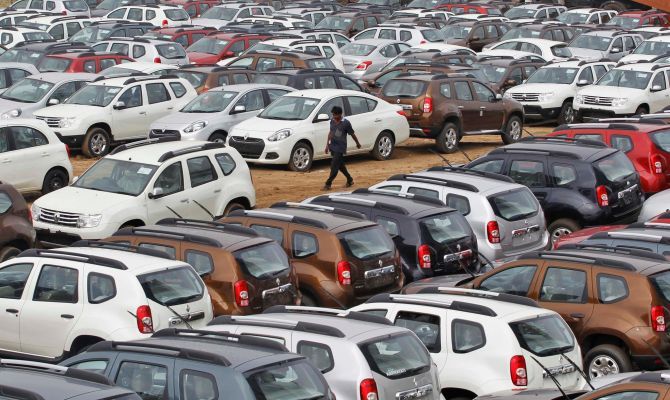 | « Back to article | Print this article |
While customers in metro cities are still buying cars, quick growth is likely only from upcountry markets, where highways and roads are being built, and discretionary income and aspirations are rising.

With automobile sales slowing to unprecedented levels, carmakers are pinning their hopes on smaller towns and cities to boost growth.
Most large manufacturers have been tapping non-metro cities for a while, but now there seems to be an added focus.
This is because while customers in metro cities are buying cars still, quick growth is likely only from upcountry markets, where highways and roads are being built, and discretionary income and aspirations are rising.
Maruti Suzuki, the biggest carmaker in the country, adds around 200 outlets every year with more than half in small towns.
Tata Motors opened 317 new showrooms across tier-III and -IV cities in the last three financial years - 92 in 2016-17, 86 in 2017-18, and 139 in 2019-20. Mahindra & Mahindra opened 370 showrooms, both small and large, in tier-III and -IV towns - double of what they did in the two previous years.
Shashank Srivastava executive director, marketing and sales, Maruti Suzuki, said the top 20 cities contribute to almost half of all passenger sales.
“In recent years, smaller towns have increased sales volumes and upcountry markets contribute around a third of sales,” he added.
For Maruti, rural sales grew from 9 per cent of its total volumes in 2008 to 40 per cent last year (2017-18).
Veejay Ram Nakra, chief of sales and marketing, automotive division, Mahindra & Mahindra, said with the government pushing for better roads and higher digital penetrations, purchasing power and aspiration levels in rural India are going to rise.
This, in turn, will push rural sale of cars.
Sales have dipped across all categories, but the passenger cars segment - that generates the most revenue - has shrunk most in the past decade.
Mayank Pareek, president, passenger vehicle business unit, Tata Motors, agreed with Nakra.
“We regard small towns and rural areas as the next engines of growth for our passenger vehicle business,” he said.
Tata Motors operates in more than 500 emerging market outlets and plans to increase it to 650 by the end of this year.
The rural market currently contributes 40 per cent of the total sales.
Retail sales from its rural outlets have grown at a four-year compound annual growth rate of 20 per cent.
Rural sales are a key part of Hyundai’s sales strategy, said Vikas Jain, national sales head for Hyundai Motor India.
“Creation and development of markets in the hinterland involves building consumer understanding, product customisation, relevant pricing, value engineering, and innovative modes of advertising and promotion - all designed to increase consumption and open up new markets,” he added.
Maruti is doing just that. In Haryana, the company piloted only two weeks back what it calls Mobile Nexa Terminals, in small towns such as Bhiwani, Jind, and Fatehbad.
The terminals are customised Volvo trucks containing one vehicle and space to display accessories.
These will travel to smaller towns and ramp up in due course.
To cater to new customers, Hyundai is also enhancing rural reach. It opened 425 rural sales outlets in 2017.
Till end-May 2019, it has already opened outlets at 478 locations.
Rural sales contribute about 17 per cent of total volumes.
The numbers in the industry have been falling and consumer sentiment is weak.
There is hope that this might change once the monsoon sets in.
However, a stable government at the Centre and continued easing by the RBI also ought to boost growth.
Photograph: Amit Dave/Reuters